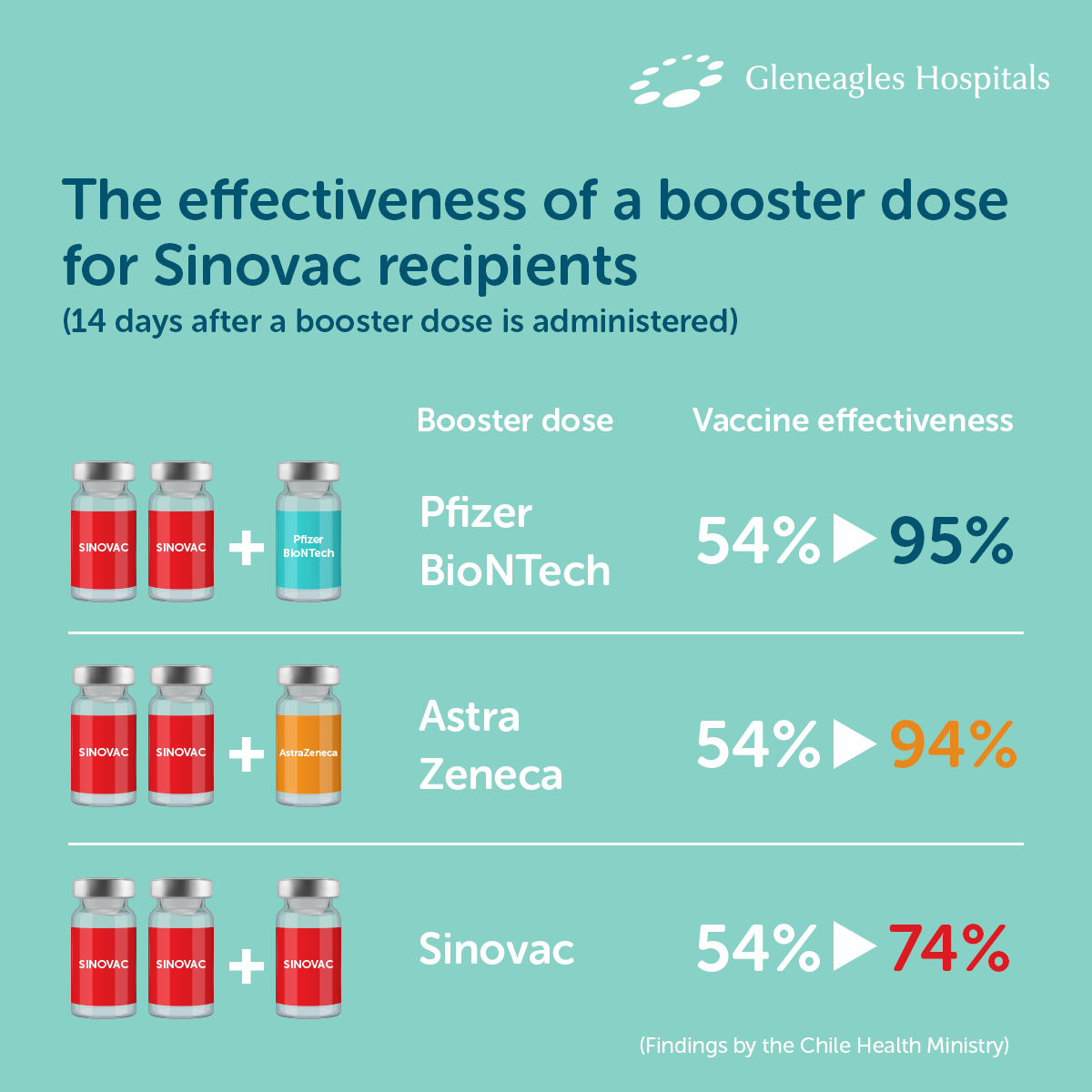
The programme of booster dose administration, otherwise known as PICK-B, began nationwide in Malaysia on 13 October 2021 for individuals who have completed two doses of vaccination. This programme is expected to cover 23 million individuals in Malaysia.
What you need to know about the COVID-19 vaccine booster doseBooster dose is necessary to ensure that immunity against COVID-19 can be maintained for an optimal period considering the emergence of variants, including the Omicron.
Even after being fully vaccinated and you have completed your booster dose, the safest way forward is for us to still adhere to the prescribed preventive measures to slow down and eventually stop the spread of the virus:| Why is there a need for booster dose? | Similar to the development of natural immunity after being infected by COVID-19, the immunity formed after completion of vaccination decreases after a certain period of time. Protection against COVID-19 infection wanes 3–5 months after immunisation, according to RECoVaM research. Administration of booster dose is highly recommended to restore the protection against COVID-19 to an optimal level. This is to ensure an optimal period of coverage is obtained by the vaccine recipients. Get a booster dose when it is your turn! | ||||||
|---|---|---|---|---|---|---|---|
| Who is eligible for a booster dose? | All Malaysian residents aged 18 and above who have completed vaccination at least 3-6 months ago. Priority will be given to:
| ||||||
| How is the interval between a 2-dose primary series and a booster dose measured? | The interval between a 2-dose primary series and a booster dose varies depending on the type of primary dose that you had received. Vaccines that are used for booster doses are Pfizer-BioNTech, Sinovac, and AstraZeneca. Booster doses can be given either with the same type (homologous) or different type (heterologous) based on advice from the Technical Working Task Force and Director General of Health's circular No.1/2022. The interval measured is in calendar months, regardless of the date.
| ||||||
| Does my booster dose need to match my first two doses? | The “COVID-19 vaccine effectiveness assessment in Chile” study released by the Chilean government at a World Health Organization (WHO) consultation on October 25, 2021 showed that the combination of the Sinovac vaccine with either Pfizer-BioNTech or AstraZeneca as the booster dose increases vaccine efficacy.
 | ||||||
| What is the dosage for a booster dose? | The dosage for the Pfizer-BioNTech COVID-19 booster dose is 0.3ml. Sinovac recipients will receive the same booster dosage. | ||||||
| What vaccine will Sinovac recipients receive for a booster dose? | In Malaysia, Sinovac recipients may receive a booster dose of either Pfizer-BioNTech (heterologous) or Sinovac (homologous) 3 months after their second dose. Whether a booster dose is homologous or heterologous, there is an increase in vaccine effectiveness when it is given to an adult. | ||||||
| Is a Pfizer-BioNTech booster dose the same formulation as the existing vaccines? | For Pfizer-BioNTech recipients: Yes, it is the same as the current COVID-19 vaccines. For Sinovac recipients: It is a different vaccine type as the Sinovac COVID-19 vaccine is an inactivated virus, while Pfizer-BioNTech is an mRNA vaccine. Sinovac recipients may be given a heterologous booster dose of Pfizer-BioNTech to improve the vaccine efficacy. | ||||||
| If I need a booster dose, are the COVID-19 vaccines working? | Yes, the approved COVID-19 vaccines continue to be effective at preventing severe illness, hospitalisation, and even against the COVID-19 variants. | ||||||
| Are the booster doses safe? | Yes, all COVID-19 vaccines approved by the National Pharmaceutical Regulatory Division (NPRA) for use in Malaysia are safe and effective. NPRA is the body responsible for evaluating vaccines to be registered in Malaysia. So far, the COVID-19 vaccine for Malaysia has been given conditional approval based on strict compliance with the assessment of scientific, clinical, and technical data. The Drug Control Authority (PBKD) will approve the use of the vaccine for Malaysia based on the results of the NPRA assessment. | ||||||
| What is the difference between additional dose and booster dose? | Additional dose is given to those who may not have responded adequately to the primary vaccination series (immunocompromised). It is given at least 28 days after completing the primary vaccination series. Booster dose is given to those who likely had an adequate initial response but whose immunity may have waned over time (waning immunity). It is given 3 months after completing the primary vaccination series. | ||||||
| What should I do before receiving my booster dose at Pusat Pemberian Vaksin (PPV)? |
| ||||||
| What should I pay attention to after receiving my booster dose? | There is no evidence to indicate that individuals can develop health complications after receiving the booster dose. The side effects of getting a booster dose are similar to those that occur after primary vaccination series, and most side effects are mild to moderate. An individual may experience common side effects such as pain, redness or swelling in the shoulder muscle area where the injections are given, fatigue, headaches, muscle pain, chills, fever, and nausea. On a positive note, these symptoms will usually get better after a few days.
| ||||||
| When am I eligible for my booster dose? | If you have received your booster dose appointment via MySejahtera, that’s great! Please remember to show up on time at the designated Pusat Pemberian Vaksin (PPV) for your dose. If you are already eligible but have yet to receive your appointment, here’s what you should do:
| ||||||
| What should I do if I missed my booster dose appointment? | If you missed your booster dose appointment, here’s what you should do:
| ||||||
| Will a booster dose be given annually? | The Ministry of Health will review the data from time to time before deciding whether or not to make the COVID-19 vaccination an annual immunisation. It will depend primarily on the vaccine’s effectiveness and safety profile. | ||||||
In line with the Ministry of Health (MOH) Malaysia’s efforts to prevent a further increase of COVID-19 cases in the country, Pantai Hospital Kuala Lumpur is providing tests through our Drive-Thru Screening Service.
This service includes a technique called PCR (Polymerase Chain Reaction), which has a higher sensitivity to detect COVID-19 as compared to rapid test kits that are more common in the market.
For more information on our screening services, or to find out more about the COVID-19 Immunisation Plan, get in touch with us today.
Resources:
Wait a minute